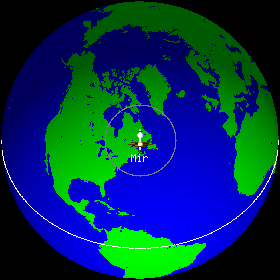This image shows MIR's position as of 12:03 p.m. EST on March 19, 2001. MIR was above Canada at an altitude of 227 kilometers.
Courtesy of NASA
Round and Round Mir Goes...
News story originally written on March 19, 2001
Where it falls nobody knows? Well, nobody knows the exact location! It looks like MIR will fall into
the Earth's atmosphere on March 22, 2001. MIR will be the largest man-made object re-enter the atmosphere. Much of the 135-ton space station will burn up, but up to 20 tons could fall to
Earth!
Russian mission control will try to control the reentry of MIR by using a series of braking impulses called burns to sink the space station in its orbit. The Russians are of course trying to time things so that MIR falls through the Earth's atmosphere over the vast expanses of the Pacific Ocean. Without the burns, MIR would fall into the Earth's atmosphere at the end of the month anyhow; Russia is just trying to control where it comes down.
The Russians are reassuring everyone that MIR will not fall over inhabited land. But, people in Japan, Australia and New Zealand have been voicing a bit of concern. "There's no way to put the brakes on at over 17,000 miles per hour," says U.S. Space Command spokesman Perry Nouis. "Re-entry is more of an art than a science."
Since re-entry is more of an art than a science, only time will tell the fate of this 15-year-old station.
You might also be interested in:
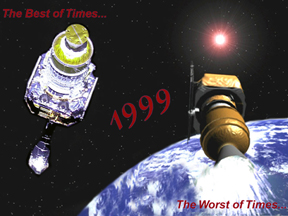
It was another exciting and frustrating year for the space science program. It seemed that every step forward led to one backwards. Either way, NASA led the way to a great century of discovery. Unfortunately,
...more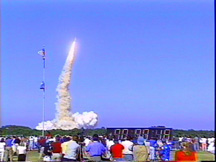
The Space Shuttle Discovery lifted off from Kennedy Space Center at 2:19 p.m. EST, October 29th. The sky was clear and the weather was great as Discovery took 8 1/2 minutes to reach orbit for the Unitied
...more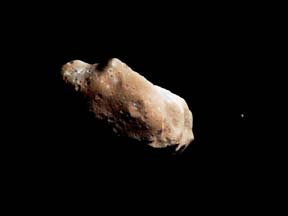
A moon was discovered orbiting the asteroid, Eugenia. This is only the second time in history that a satellite has been seen circling an asteroid. A special mirror allowed scientists to find the moon
...more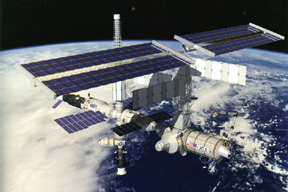
Will Russia ever put the service module for the International Space Station in space? NASA officials are demanding an answer from the Russian government. The necessary service module is currently waiting
...more
During a period of about two days in early May, 1998, the ACE spacecraft was immersed in plasma associated with a coronal mass ejection (CME). The SWICS instrument on ACE, which determines unambiguously
...more
J.S. Maini of the Canadian Forest Service has referred to forests as the "heart and lungs of the world." Forests reduce soil erosion, maintain water quality, contribute to atmospheric humidity and cloud
...more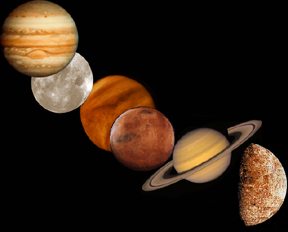
In late April through mid-May 2002, all five naked-eye planets are visible simultaneously in the night sky! This is includes Mercury which is generally very hard to see because of its proximity to the
...more
